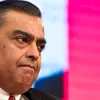Affle to acquire 8 pc stake in indigenous app store Indus OS for Rs 21 Cr
According to a regulatory filing, Affle will pay $2.86 million or about Rs 21 crore to Indus OS for the stake.
Mobile advertising company Affle on Thursday said it will acquire eight percent stake in smartphone operating system firm Indus OS.
"Affle (India) Ltd, through its subsidiaries, announced the signing of a definitive agreement to acquire eight percent ownership in OSLabs Pte Ltd, Singapore, (Indus OS). Indus OS operates India's largest independent indigenous app store, with key investment from Samsung Venture Investment Corporation," Affle said in a statement.

According to a regulatory filing, Affle will pay $2.86 million, or about Rs 21 crore, to Indus OS for the stake.
"We derive significant synergies with the Indus App Bazaar which, through its multi-lingual capabilities, deeply enhances our vernacular scale and the verticalisation strategy.
"It strengthens Affle's position as the enabling platform for the indigenous apps ecosystem in India, ensuring a digitally inclusive growth for our customers," Affle Chairman, MD, and CEO Anuj Khanna Sohum said.
Indus OS has 'Indus App Bazaar', which comprises over four lakh apps accessible in English and 12 Indian languages — Hindi, Gujarati, Marathi, Tamil, Telugu, Urdu, Odia, Punjabi, Malayalam, Bengali, Assamese, and Kannada.
Indus OS platform with its indigenous app store capabilities, thousands of apps and powered by a robust app recommendation engine, is deployed by Samsung and many Indian OEMs (original equipment makers).
"This deal would strategically strengthen our market position and create a leading one-of-its-kind engagement model for the Indian users," Indus OS Co-founder, Director, and CEO Rakesh Deshmukh said.
Affle was set up in April 2005 with an SMS-based marketing solution when 3G didn’t exist, PDAs (personal digital assistants) devices were all the rage, and the smartest phone around was the Blackberry. Even back then, Founders Anuj Khanna Sohum and Anuj Kumar were convinced that consumers would be spending a lot of time on their mobile phones.
(Disclaimer: Additional background information has been added to this PTI copy for context)
Edited by Kanishk Singh








